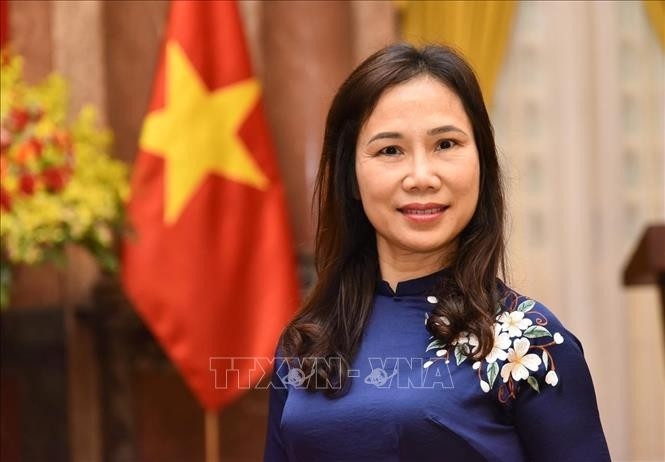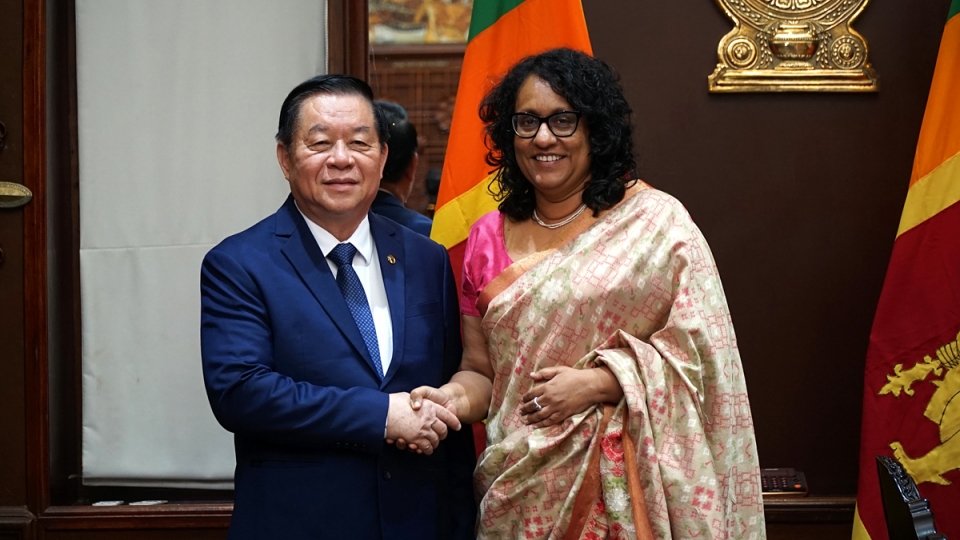Vietnam-Sri Lanka relations grow continuously over past 55 years: diplomat
Bilateral relationship between Vietnam and Sri Lanka has continued to achieve many significant milestones and encouraging successes through 55 years of establishment and development, despite ups and downs of the history, Vietnamese Ambassador to Sri Lanka Trinh Thi Tam affirmed on the occasion of the 55th anniversary of bilateral diplomatic ties.

As the two countries share many similarities in history, geography, and culture, they have had longstanding connections even before establishing consular relations in 1964, Tam told the Vietnam News Agency.
First, both sides have maintained fairly regular exchanges of delegations and contacts from early, contributing to strengthening mutual understanding and trust. Right from the first years after Vietnam’s reunification and the establishment of diplomatic relations, high-level Vietnamese leaders visited Sri Lanka, notably the trips by Minister of Foreign Affairs of the Provisional Revolutionary Government of the Republic of South Vietnam Nguyen Thi Binh in 1976, and Prime Minister Pham Van Dong in 1978.
Second, they have established and regularly maintained three important cooperation mechanisms: The Joint Committee at the Foreign Minister level, the Political Consultation at the Deputy Foreign Minister level, and the Joint Subcommittee on Trade at the Deputy Minister of Industry and Trade level. These mechanisms contribute to periodic reviews and the promotion of cooperation in specific fields.
Third, the two countries have signed nearly 40 cooperation documents covering key areas such as trade, investment, defence, agriculture, culture, education, and fisheries, with the five most recent agreements on customs, machinery manufacturing, trade promotion, education, and agriculture signed during President Anura Kumara Dissanayake’s state visit to Vietnam in May. These form a solid legal foundation for comprehensive cooperation between their ministries and sectors.
Fourth, although modest, bilateral trade in recent years has remained stable at around US$300 million per year. Both countries are committed to reaching the goal of US$1 billion in the near future. Encouragingly, Sri Lanka currently has more than 30 investment projects in Vietnam with a total capital of over US$43 million, ranking 64th out of 150 countries and territories investing in Vietnam, while the latter has one project worth approximately US$300,000 in Sri Lanka in the construction sector.
Fifth, cooperation in culture, Buddhism, and people-to-people exchanges is becoming a potential area in bilateral relations. Last year, nearly 15,000 Sri Lankan visitors came to Vietnam; religious institutions from both countries are implementing many meaningful cooperation and exchange programmes. The Vietnamese community in Sri Lanka is growing, currently numbering about 150 people, who have contributed to the socio-economic development of the host country, Tam stated.
In the context of ongoing unpredictable changes in the region and the world, the ambassador stressed that strengthening cooperative relations is even more important, not only for the benefit of the two countries' people but also as a positive contribution to maintaining peace, stability, and sustainable development for humanity.
She suggested the two nations actively implement the commitments and agreements reached during recent visits, especially the Joint Declaration issued on the occasion of the Sri Lankan President’s trip to Vietnam, thereby contributing to elevating bilateral relations to a new level.
Priority should be given to promoting cooperation in strong and potential fields such as agriculture, fisheries, tourism, and trade; and striving to achieve concrete, practical results, thus creating a fundamental breakthrough that paves the way and motivates other areas of collaboration such as defence, security, energy, mining, construction, logistics, telecommunications, pharmaceuticals, technology, and sports.
Special attention should be paid to the exchange of measures and sharing of experiences to promote and expand economic, trade, and investment cooperation, as these are the priorities for both countries in the current development phase, Tam said, affirming that Vietnam is ready to share with Sri Lanka its experience in attracting foreign investment, and expanding export markets and labour mobility.
Both sides need to open up and create conditions for their goods to access each other's markets; consider establishing joint ventures for exploitation, production, processing to export to third countries, in order to save on production costs, transportation time, and reduce tariff barriers; and also consider initiating negotiations on a bilateral trade agreement and strengthening connectivity to facilitate trade.
Tam also urged Vietnam and Sri Lanka to promote cooperation to jointly tackle global challenges such as climate change, energy transition, and cybersecurity, thereby not only deepening bilateral ties but also contributing to security and development in the region and the world.
The two countries should maintain close coordinate and mutual support at the United Nations, the Non-Aligned Movement (NAM), and other cooperation mechanisms, thus contributing to peace, stability, and development in the Asia-Pacific region and the world at large, she added.



